Serological blood test for hepatitis, HIV, syphilis and other diseases
If a child has a suspected infectious disease, he is prescribed a serological blood test.
Serological analysis is called, which is based on the interaction of antigens and antibodies in human blood. In this study, you can both identify the disease to which the child’s immune system responds, and determine its stage or check whether the treatment is effective. About the rest blood tests Read in another article.
Indications for analysis
Serological blood tests will help identify:
- Toxoplasmosis;
- Amebiasis;
- Opisthorchiasis;
- Giardiasis;
- Autoimmune diseases;
- Viral hepatitis;
- Rubella;
- Tick-borne encephalitis;
- Chlamydia;
- Herpes;
- Parotitis;
- HIV and many other infections.
The analysis is also prescribed to assess the features of the course of the disease and ensure the correctness of the prescribed treatment. The serological studies include the determination of the blood group.
Training
Going with a child for a serological test of blood, it is important to know that tests pass on an empty stomach.
On the day before the test, it is recommended to avoid sweet and fatty foods, not to overeat, and also to avoid excessive physical exertion. All these factors can distort the results. If there is a study on viral hepatitis, a day or two before the analysis should be avoided brightly colored fruits and vegetables.
How is the analysis done?
For analysis, blood serum is used, to which antigens or antibodies are added. According to the chemical reaction, it is concluded whether there is a disease. Blood is taken from a vein.

What tests are considered normal?
In the absence of antibodies, it is determined that the child has no infection. But even if antibodies are detected, it does not indicate the activity of the infection, especially if the child has been sick in the past.
In order to confirm the infection and the active infectious process, the analysis is repeated and the extent to which the amount of antibodies has increased is evaluated.











